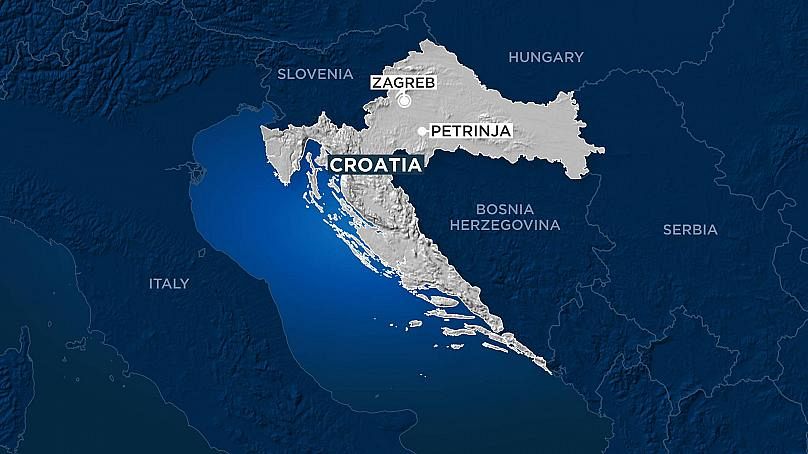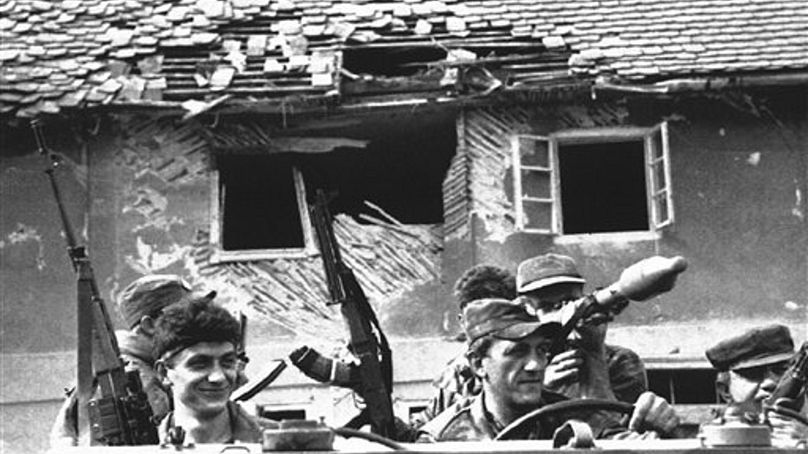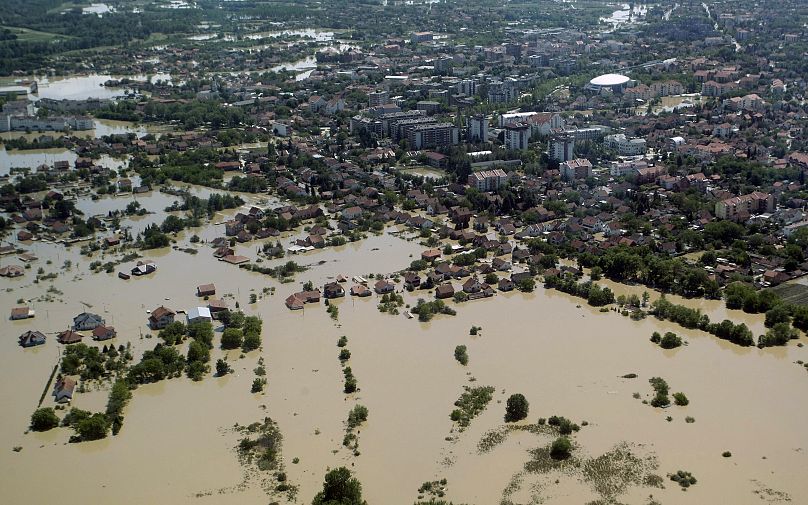Tensions persist between Croatia and Serbia after the devastating wars in the 1990s. But they have been put aside as the region unifies to help Zagreb after Tuesday's deadly earthquake.
It's a quarter of a century since peace ended years of bloodshed in what used to be Yugoslavia.
Yet ethnic tensions regularly flare-up between Serbs, Croats and Bosniaks as the legacy of the wars in the early 1990s.
So, when a 6.4-magnitude earthquake rocked Croatia last week, their Balkan neighbours turned a blind eye, right?
“We have hundreds of offers from people in Serbia, who are willing to accept those whose homes are destroyed in Croatia," Aida Corovic, a former MP and long-time humanitarian from Belgrade, told Euronews.
"Now we are collecting help (food, blankets etc) in order to give it to those in need. Again, [the] offer is for people, regardless of their ethnicity.”
The region descended into war in the early 1990s, after the break-up of Yugoslavia sparked calls for independence from ethnic factions, including Croats. The Serb-dominated Yugoslav army tried to put down the uprising. Hundreds of thousands were displaced or killed in the subsequent war, which was paused following a ceasefire in 1992.
Croatia then became embroiled in a war in Bosnia, who had become the latest former constituent of Yugoslavia to try for independence. The 1992-1995 conflict in Bosnia saw around 100,000 people killed and Europe's first genocide since World War II.
The epicentre of Croatia's earthquake on Tuesday was in Petrinja, which sits between the capital Zagreb and the border with Bosnia.
Petrinja was deeply affected by the war. During the conflict, it was under the control of Serbian rebels who opposed Croatia's independence.
But the town's ethnic Serb majority were driven out at the climax of the war in 1995. They were among 250,000 Serbs displaced during Operation Storm, still one of the main bones of contention between Croats and Serbs.
Petrinja's wider region has even more historical baggage. During World War II, Nazi Germany puppet state, the Independent Croatian State, it saw numerous atrocities against ethnic Serbs.
Even today, Belgrade and Zagreb are far from reconciliation. Several times a year there are disputes or exchanges of inflammatory language.
But volunteers and activists have told Euronews these tensions have been put aside in the aftermath of Croatia's earthquake.
“It is like after hard-drinking night: people in the region are coming to their senses about the misfortune that hit 'the other one'," said Corovic
"The people in power in ex-Yugoslav republics are coming to their senses, despite the populist narrative from their political elite.”
“On the basic level, it is important that people do not lose their sense of solidarity, since we share [the] same cultural 'space'. The divisions are political but when things are hard, a sense of self-preservation and self-organizing awaken.”
Corovic said she went to the Croat embassy in Belgrade on Wednesday to offer help, moving Zagreb's ambassador to Serbia, Hidajet Biscevic, to tears.
“It is important that people in Croatia, regardless of their ethnicity, know that they are welcome and they have somewhere to go and that someone is thinking about them,” added Corovic, who said Croats had helped Serbs when floods hit in 2014.
Back in Petrinja is war veteran Janja Slijepcevic, who fought on the Croat side.
“Every 15 minutes lorries with help arrive [in the region]," explained Slijepcevic, who said the current devastation in Petrinja was worse than during the war in the 1990s. "Help is coming from Serbia, Bosnia, North Macedonia, and all the former republics.
"Despite everything that happened in the past, this is a good sign. This most unfortunate event brought out the best in all nations."
“Look, this is former Yugoslavia or as it called today, the Balkans. We are a bit strange: while we fight we are the worst enemies, but when something happens like this, we join forces and work together. I really hope that emotion will stick and that we will move, as societies, toward reconciliation.”
Amina Kurtagic, an activist in Sarajevo, the capital Bosnia and Herzegovina, said help was being collected there to send to Croatia.
But, she added, the COVID-19 restrictions have shut the border with Croatia, unless the traveller has a negative test result with them.
“We, the people in the Balkans, are over-sensitive when something bad happens to our neighbours," she said. "People want to do a PCR test [for COVID-19] just to get to Croatia and help.
"We are waiting for [the] green light from the authorities to send help and people, to help remove the rubble."
Branka Baksic Mitic, deputy mayor of Glina, near Petrinja, said the pandemic had prevented some of the help getting through.
But she said, financial help was coming from Bosnia and Serbia, which would be used to buy mobile housing.
“A lot of rubble need to be removed, there are people trapped under it also," she said. "I have over 300 people without a roof over their head and now, we are missing housing the most. I fear that in a short time, people here will be forgotten.
“We need this provisional housing for affected people. Hotels in Croatia, A-class ones, opened their doors for our citizens, and there are offers for housing from the region. But this is an agricultural region, a lot of people have cattle that they will not leave behind. That is why it is important to get them mobile houses."
Every weekday at 1900 CET, Uncovering Europe brings you a European story that goes beyond the headlines. Download the Euronews app to get an alert for this and other breaking news. It's available on Apple and Android devices.














